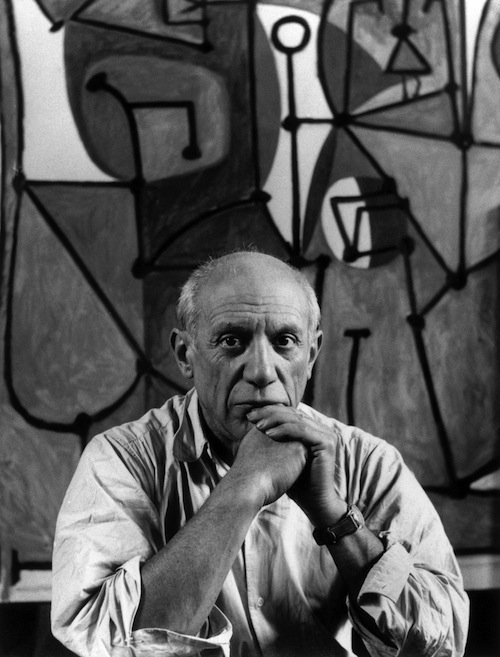25 Points: Out of My Skin
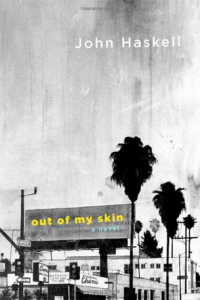 Out of My Skin
Out of My Skin
by John Haskell
FSG, 2009
224 pages / $4.95 buy from Powell’s
1. Out of My Skin by John Haskell is about a man (named Haskell) who goes to Los Angeles and becomes interested in a Steve Martin impersonator. It’s about wanting to change who you are. It’s about identity and the loss of self in pursuit of some ideal.
2. The real Haskell was a journalist who moved to LA from NY. He wrote a collection of short stories called I Am Not Jackson Pollock. Over the course of nine stories, Haskell writes about movies and their actors. He confuses the actors with the roles they play because it symbolizes the confusion of outward expression and inward intention. There is a dichotomy of who the person is versus who the person wants to be or the role they are playing.
3. I started reading this book around the time the Mayan calendar was ending and the regular calendar was ending. There was some talk about change and transformation. I’ve always found New Years’ celebrations to be arbitrary. Why do people dedicate themselves anew at the beginning of the year, a random point in time? Why do people want to start over? And yet I am susceptible to it.
4. I shaved my head and my face. I wanted to be a different person. I was tired of my choices, decisions, life. What does it take to transform yourself?
5. This book is written in a way unlike any other book by any other author I have read or heard about. And I’m sure someone could say why or how it is different using literary criticism. But I didn’t read it in a litcrit way so my experience of it was maybe more pure. I liked it for what it was doing to me, how it made me experience reading in a totally new way, how it changed me.
6. One thing that is different about this book is that it is more focused on ideas than action. But the ideas are realized through specific events and objective narration. It is not pure theory. This story, the things that happened and the way it is told, makes you think about things, makes you observe them, the things in the book and in your life. It transcends the book, so that it changes you, affects you.
7. Every sentence is infused with meaning as if no one had ever thought of the way things correlated before, how everything fits together, the narrator keenly observing everything and trying to wring some kind of desperate meaning from normality. “I could feel the blades of grass pressing up through my shirt into the skin of my back.” This could be a description in any book, but because of what is happening in this book, it takes on an uncanny resonance.
8. Every time I go on a trip, I think change is possible when I return. I think I’ll become a different person or I believe I am a different person slipping into the disguise of who I used to be, but then that disguise, my real persona, wins out and takes over.
9. The character Haskell lets the Steve persona attain for him certain things he feels himself incapable of. But after a while he can no longer maintain the desire for the things that his Steve persona has attained. Being Steve has gotten in the way even though he is happy, or, he becomes less happy when he loses the things because he is no longer being Steve.
10. “By becoming Steve and then becoming not-Steve, I’d become a nonentity.” At first it seemed like this anonymity in LA would mean a loss of control, would make him too vulnerable, but it seemed to be what he actually wanted in the first place. Douglas Coupland writes in Life after God about how strange it is that you can never park your body and float free. But it seems like you can. There are drugs and alcohol which diddle your brain just enough to get you to feel a different way. You can also do it by projecting your mind. You can leave your body by reading a book. READ MORE >
January 8th, 2013 / 6:02 pm
My Experience Writing for Muumuu House

Wrote about Tao Lin for Hobart.
Exchanged emails with Tao about what I wrote.
Tao cut and pasted part I’d written about Zac Zellers and Marie Calloway and wrote beneath it “this seems funny to me.”
Replied with a paragraph in which I described Zac Zellers as the “Where’s Waldo” of Ann Arbor.
19 mins later got email from Tao saying “you should write something about this and send it to me.”
25 Points: The Emily Dickinson Reader
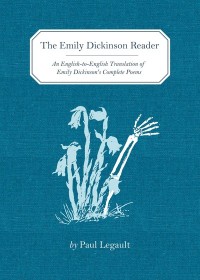 The Emily Dickinson Reader: An English-to-English Translation of Emily Dickinson’s Complete Poems
The Emily Dickinson Reader: An English-to-English Translation of Emily Dickinson’s Complete Poems
by Paul Legault
McSweeney’s, 2012
247 pages / $17.00 buy from McSweeney’s
[Note: In the text that follows, the leading number refers to the catalog number assigned to each Dickinson poem and its accompanying translation. These numbers are derived from the Franklin (1999) edition of Dickinson’s oeuvre. The trailing trailing number appearing in square brackets references the actual “point number”, and thus the in order in which the reviewer would prefer, although would not require, that these 25 points be read. JM]
12. Concurrent with my reading of Legualt, I’ve been following Brandon Brown @ Harriet (the blog) on translation. How he says, “There is no master.” I feels it applies here, too. But maybe Brown and Legault are colleagues, correspondents, even. (One of them, surely, is wren-like and sherry-eyed.) Or the inventions are independent identicals, like Darwin and that other guy*. I imagine Brown and Legault meeting in some profile coastal city with a very specifically desirably demographic profile, dotted with saloons and taverns, meeting over craft beers intensely hoppy and a shared literary ambivalence which tastes of salt without being salty per se. But this meeting, which is like a prelude to a deeper or longer encounter, this meeting wordless, sudsy… these beers, these refreshments bitter and compulsory… the possibility of Brown and Legault merely overlapping at the bar is as far as my imagination goes. And is this stopping heartful, braked by the anxiety of influence? “Emily Dickinson wrote in a language all her own, thus the need for this English version of what she meant.” (7) Wait, so does the agony of influence deny the mortification of the flesh? [3]
29. Handed over to the hand that writes, “simple” and “direct” are always driven forward. I mean, forward as out or away, into that exile that enable observation, not into the completed future of conveyance. (That, and I just don’t trust McSweeney’s.) [4]
98. Biography bugs me most of all. I wish we had no daguerrotypes of Dickinson to caption. I wish reading really pressed some sort of pause button on life itself. I wish I didn’t feel like I, too, know how caretaking will warp you. [16]
167. But with such rueful wishing, if not in it, a realization disappoints me with surprise and surprises me with disappointment: I have this idea all the time. [25]
221. Translation isn’t telling, much less re-telling. But it snags in the same temporal flow as does narrative. [7]
319. What was Dickinson herself translating? Emerson? Swedenborg? Whiteness: “racial,” temperamental, existential (not a word she would have recognized, not for all the tenements in Amherst)? The Puritanism that idles with such delightful perversity in Frost’s “The Generations of Men”? The erotics of a universal chlorosis? Proverbs she found when she dreamed of communion in the hills so misty from her gnomic lookout? Hell, that’s it. Dickinson, even her doubts are too bold. For all Legault’s contemporary light shines, it can’t cast her shadows. [8]
333. Not that I think Dickinson’s—or any poet’s poetry, for that matter—is inviolable. Reading it will always rough it up anyway. But what about introversion? [2]
392. Consider Paul Legault’s project a sort-of ekphrasis on Dickinson’s unwritten autobiography. Consider that Dickinson’s medium isn’t poetry, that Legault’s isn’t comedy (though more than a few of these read as if they could have been spouted by a vintage, arrow-through-the-head Steve Martin), that there is no translation evident here, only notation, only commentary, only adumbration, thoughts broken in the process of their own manufacture by the machine that is, quite literally is, addiction to the author’s held-out promise of exegesis. Consider your prurient self covertly mocked. [21]
421. Emily Dickinson isn’t your friend, and never was. Anyway, friendship thrives on novels (its parasitic), not poems. And Emily Dickinson does care, in the sense that she wants to know something true of her own being. That she would exemplar herself, if only privately. [20]
438. The apostrophe of the second-guess. The syntax of the spit-take. After all, the literal is the absurd. [13] READ MORE >
January 3rd, 2013 / 12:09 pm
25 Points: Anne Frank: The Diary of a Young Girl
 The Diary of a Young Girl
The Diary of a Young Girl
by Anne Frank
Bantam Books, 1993
304 pages / $5.99 buy from Powell’s
1. I want to write about Anne Frank. I am mid-way through reading The Diary of a Young Girl and I know what is coming. The discovery of the eight inhabitants of the annex, their arrests, their being shipped to concentration camps. Their deaths. I know this is coming, but I do not want it to happen.
2. I have slowed my reading. Normally I read fast. A book every 2-3 days. But I have dragged Anne’s diary out for over a week now to forestall the ending.
3. When I first begin reading, I am conscious of wanting to have some kind of emotional reaction to The Diary of a Young Girl. I want Anne’s writing to affect me, but am worried that the desire to feel something w/r/t Anne Frank is somehow wrong.
4. Not only that, but I worry that wanting to feel something, and being conscious of that want, will actually preclude me from feeling anything.
5. In her diary, Anne makes reference to other things she has written: fairy tales and the opening of a novel. I want to read them. I google ‘anne frank fiction’. The results are confounding. On the first page of results are a number of links claiming that Anne Frank’s diary is itself fiction. I do not click on these links and I shake my head and scroll down further.
6. There is a link entitled ‘Do you know where I can read an Anne Frank fanfiction?’ and I get excited. It seems to me a wonderful idea to write fan fiction. I click on the link and read:
The reason it’s no longer at fanfiction.net is due to a petition stating writing about her is disrespectful and a violation of the rules as she is not a fictional character.
Um, pretty much all else I could come up with involved cross-overs, mainly one about Dragon Ball Z in which Hitler becomes a super saiyan. Good luck in your search, but as the diary isn’t fiction, trying to add fiction to it may take more away than add to her story, sad though the end may be.
7. When Anne writes about her feelings for Peter van Pels, it breaks my heart. It makes me feel sick and it makes me grit my teeth that the two of them will be dead once I have finished reading.
8. Other things that make me feel sick and make me grit my teeth: that Anne was unable to do everything she wished to do. That she wanted to be a reporter and a writer and she wanted to be married and she wanted someone to love and share her true self with and that she was unable to do this.
9. I think that maybe I could write a different ending for her. I could write the life that she never got to live.
10. Is wanting to write a different ending for Anne cruel and in bad taste? Would it ‘take more away than add’ to her story? READ MORE >
January 1st, 2013 / 4:14 pm
Why would anyone want to write, read, or listen to someone read out loud a “piece of fiction,” let alone a fucking poem?
Why would anyone want to write, read, or listen to someone read out loud a “piece of fiction,” let alone a fucking poem?
Personally, I have never written any fiction, and I don’t plan on starting any time soon.
Some habits are naturally addictive, like smoking cigarettes or eating large bags of Kettle chips, and other habits are only willfully, stubbornly repeated–one of these is sitting down and trying to write “interesting” sentences to create “literary art.”
25 Points: Infinite Jest
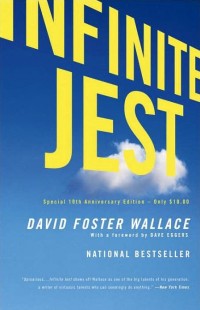 Infinite Jest
Infinite Jest
by David Foster Wallace
Little, Brown, 1996
1104 pages / $17.99 buy from Powell’s
1. David Foster Wallace was born in a small town in western Ohio, best known for its jar factory. This would figure in the book, Infinite Jest.
2. The first three pages of Infinite Jest are like a key to the novel. Without them you’ll probably be lost.
3. A palm tree is a recurring motif in the book, which seems to represent an opening and closing of the author’s heart.
4. DFW first wrote the manuscript to Infinite Jest when he was 22. He put it in a box that he carried from apartment to apartment as he studied at various schools or followed various women about the country.
5. By the third chapter, with the introduction of the character of the cabbie, you’ll probably feel confused and even ready to give up. Most people do right here.
6. Infinite Jest will seem like the driest book you’ve ever read. DFW needed to wring out the wet in literature.
7. A capable reader will read 22 pages at a time. Don’t worry if you aren’t capable. Most of us won’t be.
8. DFW refound the manuscript of Infinite Jest at age 33, when he was moving out of the house near Tulsa. He didn’t think much of it, apparently.
9. In a survey of college students, most readers found themselves skipping an average of 2 pages every 10.
10. At one point, the cabbie finds a note from his wife. This seems to represent a fracturing of the potency of language. READ MORE >
December 20th, 2012 / 9:09 am
25 Points: Woes of the True Policeman
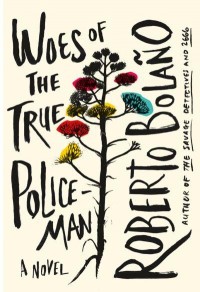 Woes of the True Policeman
Woes of the True Policeman
by Roberto Bolaño
Farrar, Straus and Giroux, 2012
256 pages / $25.00 buy from Amazon
1. I don’t want to believe this is a draft of works that were to come later.
2. And yet its opening section appears word-for-word in The Savage Detectives.
3. I’ve read over and over that Bolaño worked on this book from the 1980s up to his death in 2003. The endnote (which comes abruptly) suggests he was serious enough about it to have revised a couple of times by hand, on an electric typewriter, and on a computer. There were also two physical manuscript versions. Parts of all of these were pieced together to create this book. This corresponds with other accounts of trying to bring his posthumous work into order. I remember reading somewhere that he first wrote the name “Arcimboldi” in the late 1980s.
4. Reading that distressed me. All I could think about on the way to work later, looking at the sidewalk, was whether whoever wrote that had meant “Arcimboldi” or “Archimboldi.”
5. In 2666, we get the life story of Benno von Archimboldi, whom no one in the literary world has ever seen, and to the search for whom the entire first section is devoted. The Critics read his books constantly, sometimes over and over again as if they’re becoming ill or desperate, but with the exception of the book that makes Lotte Reiter realize that Archimboldi is her brother, we don’t get much of an idea of the novels’ content. He is a giant pacing around in the desert, upsetting animals and stones and cacti with his footfalls’ vibrations.
6. A whole section of Woes is devoted to the works and certain biographical details (friendships, hobbies, epistolary relationships, feuds) of J.M.G. Arcimboldi. One oblique reference to his disappearance is made in the book. But he is still overwhelmingly the man who’s not there.
7. I’ve drawn out the same triangle over and over again: Benno von Archimboldi–J.M.G. Arcimboldi–J.M.G. Arcimboldi (Savage Detectives). Then I stare at it, scratch my chin or suck at coffee, and wonder: what does “J.M.G” stand for? why drop the “h” (or add the “h”?)? are the two Arcimboldis the same?–only The Endless Rose appears in both of their bibliographies–is this a play on the fact that Italian artist seems to have gone by Arcimboldo and Arcimboldi? and, for that matter, is there any real connection to the painter? the fragmented man? the man made of whatever can be gleaned from the world around him? Why are the Arcimboldis French, and Archimboldi is a Prussian who writes novels that are distinctly French, Polish, and American?
8. Then there’s Lalo Cura, to whom I had been imagining the title referred to since I first saw it. He has a “prefiguration” in a short story: the child of a porn actress who later sees his mother’s work and imagines himself in the womb, cocks pressed up against his sealed-shut eyes. He grew up in Los Empalados (The Impaled). Seems like his father might have been Lacroix from By Night in Chile. He isn’t a policeman. The other two Lalo Curas are.
9. But they’re not even both Lalo Cura; one is Pancho Monje. The Madness and the Monk. Both are the product of five generations of Maria Expósitos of Villaviciosa, who are raped and then give birth to another Maria Expósito, until a son, whose father “was the devil,” kills his sister’s rapist. Then the next Maria Expósito learns to read and write, and is seduced by two (or three) students out in the desert. They are French in this book. They might be Belano and Lima in 2666. Regardless; rape in Villaviciosa creates a continuum; murder writes history.
10. I was in the labyrinthine aisle of beverage refrigerators in Mardi Gras Zone late the other night. It was maybe two in the morning, I don’t remember; I was pretty fried from work. But I see a big dark bottle on a low shelf that says “Villaviciosa” on the label, and my heart slips out of gear. It’s some kind of apple cider. But it’s from Spain. There is no Villaviciosa in Sonora. There’s a fleck on the map called Villaviciosa in Chiapas, near the Guatemalan border. I learned from a website in Spanish that it has an altitude of 780 (meters? feet?) and 5 inhabitants. I don’t speak Spanish. But the meaning of “Villaviciosa” is pretty clear. READ MORE >
December 18th, 2012 / 6:15 pm
Luna Miguel, now in English translation
The great Spanish poet Luna Miguel has a bilingual, Spanish/English-translation book coming out from Scrambler Books, entitled Bluebird and Other Tattoos. It ships December 22nd. Here is my blurb for it:
Luna Miguel is a poet who can make me cry. Her passion for life and for poetry is uncommon. She makes language concise, supple, and exciting again. Recurring images: of birds, disease, spit, and blood, integral to a mortal, embodied poetry that reminds us ‘Death cannot be experienced neither for the living nor the dead but for the sick.’ Luna writes a poem, ‘The Beautiful World Gives Me Disgust.’ She writes, ‘I exist, therefore, / then I tremble.’ She writes of the suicidal poets, she writes of all women, she writes of the young. She writes knowing it’s a lie, she lives in the shadow of death. Luna writes of her ‘unprotected life,’ her ‘unprotected diary.’ There is no comfort in this poetry, there is hard beauty. ‘The wind was this. Being born was this. Dying without dying and without a disease was this. To tell you the truth: I am here and I need you.’ Luna.
How Should A Humon Be, I Hate These Humons: The Great Autobiographical Fiction vs. Anti-Autobiographical Fiction Showdown 2k12/2k13
A thing I’ve been noticing is a formation of camps of a sort along the lines of how people feel about autobiographical fiction. Is this a thing?
I thought of this upon reading the title of a Tumblr post by my friend, James Tadd Adcox, a list of things he’s currently reading. The title: “Take this blue paint, cake it on your pale face. Make yourself something other than this world.” Something other than this world.
25 Points: The Mandarin
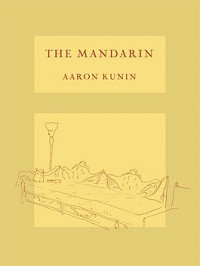 The Mandarin
The Mandarin
by Aaron Kunin
Fence Books, 2008
209 pages / $17.95 buy from Fence
1) Language is a form of disobedience.
2) Or: words have no loyalty. Or: language facilitates perversity. Or: to speak is to be reminded of language’s inescapable techné. Or: to employ language is to court malfunction. Or: to write is to run the risk of making more sense than you ever intended. Or: language is always on the cusp of being carried away. Or: talking is almost always talking back. Or: language was designed in emulation of water, a force, a flow without shape but the rare ability to hunt direction down and wear it out. Or: nothing could be more nonsensical than if our every utterance were understood literally. Or: you teach a child to say “no” at your own peril; those early “no“‘s are no ventriloquism act. Or: the so-called precise word is precisely that, so-called, a chimera. Or: to speak is to confuse irrevocably the matter of whether one is announcing something before it happens, or whether one is announcing something as a way of compelling its presence to coincide with its occurrence.
3) Aaron Kunin’s novel The Mandarin is a self-conscious (perhaps even sentient) construction of language, some phenomena I wish to differentiate from the notion of a linguistic construction… For I want the suggest that The Mandarin is more like a self-organizing discourse than it is a “work” composed-slash-authored. The Mandarin is thus less a novel as commonly defined in terms of “long story” than it is an exercise in novel-ese, or the novel as style. This is not to say that either text or author fail in any way to fully realize whatever metaphysical potential is latent in the novel-as-form. Rather, what I want to claim for this book is that it is a brilliant, occasionally scathing, yet ultimately poignant tribute to the inherent limitations of an imagination whose eide and eidola alike are utterly—dimensionally—verbal.
4) Or: The Mandarin is an exceptionally manneristic “novel of manners.”
5) Or: if you squint at it in the proper way, this is a conceptual novel. Kunin supplies a 3-page synopsis that you need not read past, excepting you wish to satisfy your curiosity regarding the novel’s execution. Quoted in full, however, I find that this explanation is just a scheme for disclosing a question that, in order to be dramatic, cannot remain undisclosed; that is, must be secret, only formerly. Is this synopsis a lie?
6) In a sense, the book is naming itself every time one look at its cover or spine, insisting that it has to remind you that it is a novel, a book that has to be taken “seriously.” And, as much as this title’s prodding is about a kind of salesmanship, the relationship between word and world is more suspect than that. Most “things” can’t speak the way a book can, nor do they suffer the arc of the Lomans. (The main character and narrator upon whom Kunin depends is a Willy.)
7) And what is a mandarin anyway? A living etymology, thus a kind of fossil, a word that survives despite going largely unused; a museum exhibit that does not have to be put on wheels because it installs itself everywhere around you the moment you decide to judge it into being. (And every time you recall Henry James.). Mandarin: it’s a pejorative, and what makes our mandarins so worthy of disdain—and so funny—is the complete un-self-consciousness (rather: blind narcissism) of the pose. Such is pedantry, this trying-so-hard-all-you-do-is-drown-flailing-in-gelatinous-effort. Even if taken as an adjective, “mandarin” is a point-of-view compact in its three syllables. An evaluation, and a coping with something which looks familiar but which we, uttering, would like to believe has naught to do with us or our position. But the use of a term like this is a power-play: it elevates us, uttering, to some superior vantage from which we can describe a sham noble. And phoniness makes of such rare essence the cheapest cardboard: what a noun like “elitism” names, just as that The here qualifies and specifies. So I think.
8) As one reads, one discovers that The Mandarin is a novel-in-conversation, but it could not be more different in tone and (apparent) intent than similar “experiments” such as Duras’ The Square or Gaddis’ JR, to take but two examples. For the exchanges here do not move toward revelation via vaguely Socratic gestures; unlike The Square, very little is asked in The Mandarin. Instead, much is pronounced. But neither does the narrator evince an obsessive’s commitment to “how people really talk”, the kind of photorealistic prose that, in Gaddis, turns everything into plastic and a kind of dense, you’ll-knock-your-knee-or-elbow-against-it nausea.
9) Rather, Kunin, through careful application of a few linguistic effects, seems to be after a parody of novelistic prosody. Example: here are “characters” who speak without relying on contractions.
Perhaps it is not so much that contractions are absent here, absence in this instance implying a forgetting, or a negligence: a grammar active, but only in the form of exiting / having left the stage. Rather, the contractions feel avoided. They have been deliberately excluded, so long as the characters retain control of their emotions or do slip from the perch of their poses.
10) Grammar is being acted upon. All of which reinforces or superimposes again, needlessly, the presence of authors, narrators and characters (the narrator, Willy, writes novels that may also be soporifics), the last two of which are authors manqué anyway. READ MORE >
December 13th, 2012 / 1:01 pm



